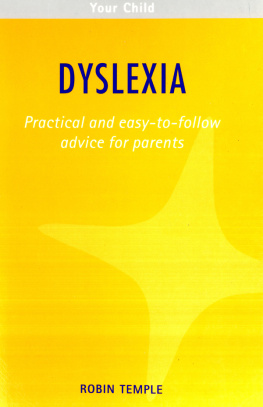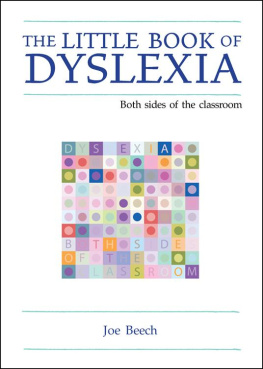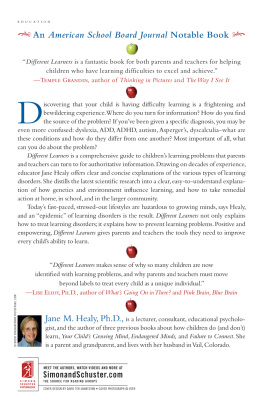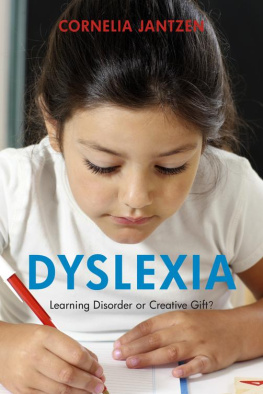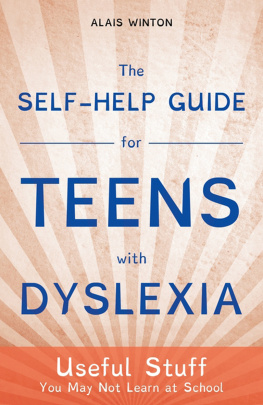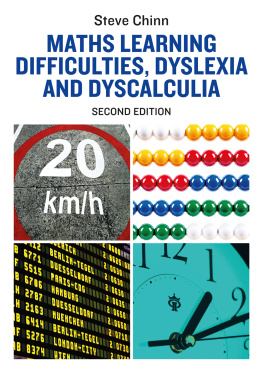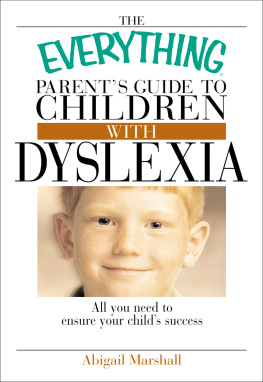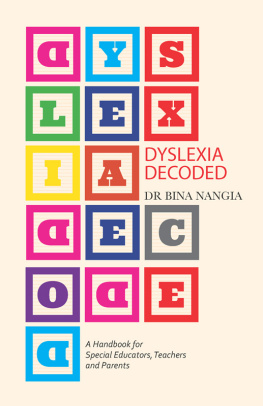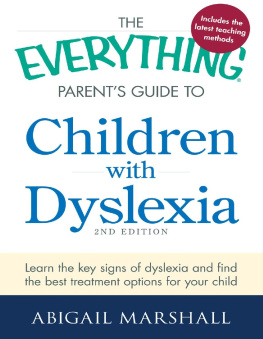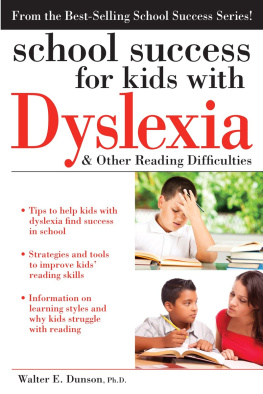Contents
About the Book
The essential guide to identifying and managing your childs learning difficulty.
Many children spend their school lives struggling with their work. This can result in feelings of frustration, demoralisation and isolation. This authoritative guide addresses these sensitive issues and offers comprehensive checklists, perceptive advice and practical tools to help you to:
- Identify dyslexia, dyspraxia, dyscalculia, attention deficit and language problems
- Understand what your childs school can do to help
- Promote reading, writing, language, number skills and concentration at home
- Reduce homework struggles and improve motivation
- Help your child find ways to compensate for difficulties
Dr Valerie Muter and Dr Helen Likierman are practising psychologists with extensive knowledge and experience of childrens learning difficulties.
About the Author
Dr Valerie Muter is a consultant clinical psychologist at Great Ormond Street Hospital for Children where she specialises in working with children with both developmental and neurologically based learning disorders. She holds an honorary research fellowship at the Centre for Reading and Language, University of York, and has carried out extensive collaborative research into reading development and dyslexia with Professor Margaret Snowling, the UKs leading authority on dyslexia. She was a consultant psychologist at the Dyslexia Institute (Dyslexia Action) for 20 years.
Dr Helen Likierman is a consultant clinical psychologist working with families and children (from pre-schoolers to older adolescents) where there are emotional, social, behavioural or learning concerns. After her psychology degree, she trained and worked as a teacher of young primary school children before moving on to clinical training and a PhD on pre-schoolers friendships and peer relationships. She worked for many years as a practising clinical psychologist in the NHS and was a consultant psychologist at the Dyslexia Institute (Dyslexia Action) for three years. In addition to her current consultant work, she is the school counsellor at a large co-educational school. She is the mother of two teenage children, one of whom has specific learning difficulties.
Also available by Dr Valerie Muter
and Dr Helen Likierman:
Prepare Your Child for School
Top Tips for Starting School

Introduction
Why is My Child Struggling?
Around the age of seven, your child should have settled comfortably into school and be coping with the work. But some children many children are already starting to have difficulties that seem surprising. If you are worried or concerned that your child is failing to progress in a way you instinctively feel is right, then this book is for you.
Children struggle at school for many reasons. Sometimes teachers and parents will say about a child who is struggling, If only we could find the key to unlock his difficulties, then hed be away. But searching for an elusive key can be successful only when all the facts are known. This is often a long and difficult process, but it doesnt need to be. If you ask the right questions and do the right kinds of observations and assessments, you will find the causes of your childs problems and therefore the solutions as well.
A parents desire to find out what their childs particular learning problems are is clearly a sensible ambition, but there can be obstacles. Sometimes it seems there is too much information out there on learning difficulties dyslexia, dyspraxia, dyscalculia, language and attention problems and this information can seem conflicting or unclear. This is not altogether surprising as even professionals disagree about the definitions, causes and treatment of learning difficulties. The controversies may be picked up by the media, but without clearly defining the issues or even being accurate. The result is often more worry for parents who feel that they may not be doing the right thing by their child or do not know in which direction to go.
In this book we separate fact from fiction. We will take you through the major learning disorders or difficulties (we prefer difficulties though you will hear the two words used interchangeably) so that you can understand them. We will help you spot your childs learning difficulties; and we will show you what more you need to find out, how to approach your childs school and how to get professional help. Finally, we will give you guidelines, based on our own clinical experience and practice, to what you can do to help your child at home.
Our book is based on the most up-to-date research and practice, on facts and evidence rather than old wives tales and myths. We draw on research and our own extensive clinical experience (which between us spans around 60 years and thousands of children) to suggest the most effective strategies. The book is for parents of children aged between 7 and 14. These are the most important years for catching problems and helping children overcome them, but obviously the earlier the better.
Step One is to find out whether your child has dyslexia or another learning difficulty or whether theres nothing too much to worry about. We ask you to start by looking in detail at the problems he or she seems to be having now, and then to look back at your childs early development. We have devised a series of checks for you to try out with your child to test out your hypothesis (belief, feeling, hunch) that he or she could have a learning difficulty.
Step Two gives you lots of ideas about how to approach professionals and to understand how they can help your child. covers what you need to know about making contact with other professionals. In particular, we take you in detail through the psychological assessment as this is so helpful for the understanding of an individual childs difficulties and needs.
Step Three will guide you through all the things you can do at home to help your child. gives you strategies for dealing with attention, homework, revising for exams, getting organised and staying motivated.
Throughout the book we draw on our own experience with a number of case histories. We start with an example. Nicholas (not his real name) is a child who came to us for assessment because he was struggling with reading at school. Have you ever said the same about your child? This is his story as told by his mother.
Nicholas
When I look back, Nicholas was such a bright and happy little boy. His dad and I could never have imagined before he started school that he would go on to have so many problems. Nicholas went to our local nursery school at age three he was so keen to go. He loved it. He liked his teachers, he enjoyed playing with the other children and he found the games and puzzles great fun. His teachers said that he settled in well they all loved him. And they said that he was so bright, that hed do well when he started school. And he seemed to get off to a good start. He loved story time, show and tell and learning about numbers. I suppose we first became a little worried when Nicholas seemed a bit slow at learning his letters. But his teacher said not to worry, that some children did get off to a slow start but usually caught up by the end of Reception. The problem was that he didnt catch up by the end of Reception. I said to his teacher, Nicholas knows only five letters of the alphabet, yet I can see that his classmates know many more. Lets see how he gets on in Year 1, she said.
Well, Year 1 came, and Nicholas enjoyed school, liked being with his friends and seemed to be doing fine with his maths. But he hated reading he wouldnt look at books at home. Hed say, Reading is rubbish, though he still liked being read to. I had a chat with his class teacher and she said, Yes, he is a bit slow getting going with his reading. Ill get our classroom assistant to do some extra work with him on his letters and send some books home for him to read with you Im sure that will help. Only it didnt! Nicholas refused to read even the simple story books his teacher sent home. If I pressed him hed throw them on the floor and have a temper tantrum. I couldnt believe how my lovely, easy-going little pre-schooler was turning into a rather miserable child with an awful temper. And I was shocked to realise that, at the end of Year 1, Nicholas still knew only five letters of the alphabet, while all the other children in his class knew them all. His class teacher was getting worried too she promised that in Year 2 the special needs co-ordinator would start giving him extra reading lessons.
Next page

